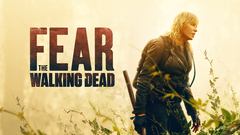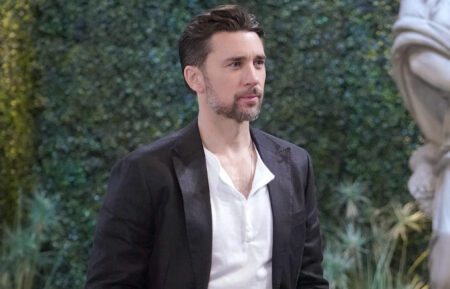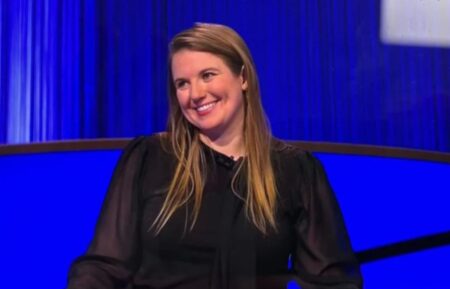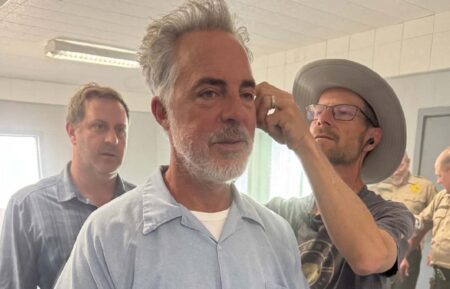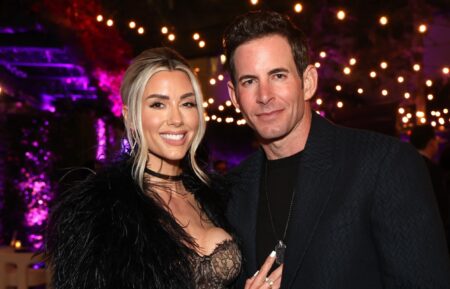‘Fear TWD’: Colman Domingo on Strand’s ‘Fully Askew’ Moral Compass
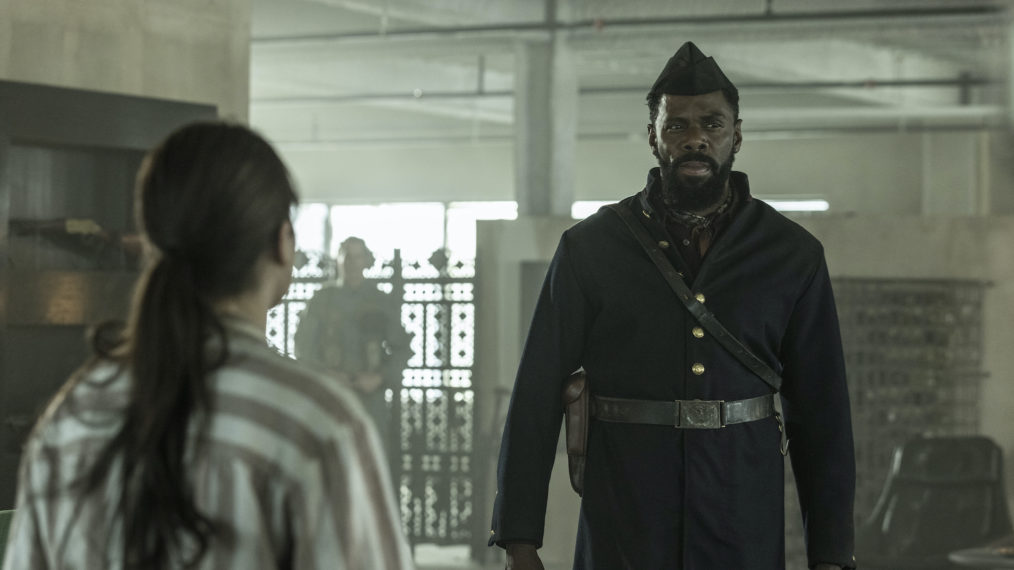
Q&A
[WARNING: The following contains MAJOR spoilers for AMC‘s Fear The Walking Dead Season 7 Episode 7, “The Portrait.”]
Maybe what Victor Strand (Colman Domingo) really needs isn’t a pristine skyscraper packed to the brim with artists, musicians, scholars and the like. Maybe what he really, actually needs is… a hug?
That’s one of the points Domingo discussed as we chatted with him about Strand’s character development throughout the first seven episodes of Fear’s seventh season. He also talked about what Strand meant when he said he wanted to be Baby Mo’s “new father”—and what’s to come for his character whenever we see Strand next.
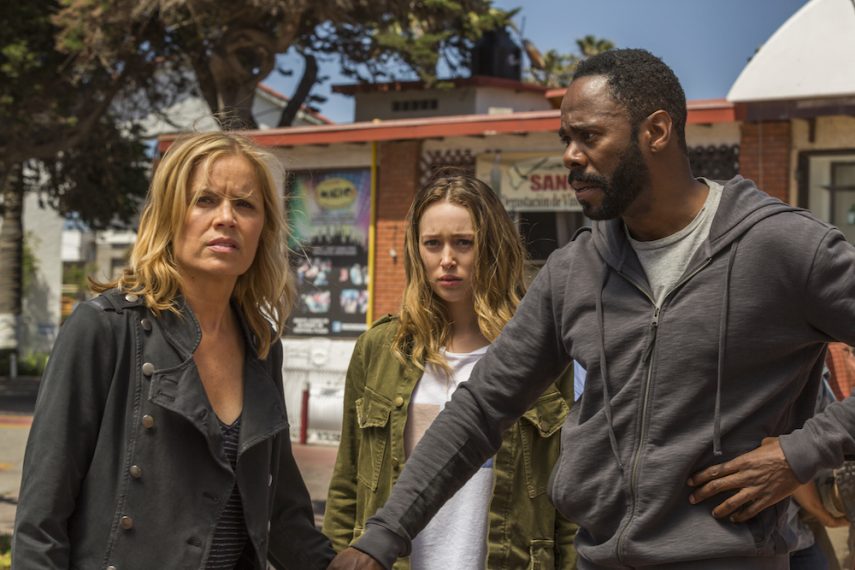
AMC
Way, way back in Season 3, Madison told Strand, “Killing drives some people mad. it never gets you what you want, and it gets easier every time.” To what extent does that apply to Strand, given the people he’s killed and where he is now?
Colman Domingo: The very interesting thing is that Strand, for many seasons, never killed. That was something we wanted to keep, with Strand—for a long time, he never even had a dedicated weapon. I would show up to scenes and be like, “Why do I always have a beat bar? Everyone else has a weapon.” They’re like, “There’s something about Strand that still is not a killer. He may be a con man, he may be many other things, but he’s not a killer. If he becomes a killer, what does he become?”
Like you said, the moment he did kill, and started killing, his moral compass went fully askew. It may have brought out the darker side of him, because he’s had to cut off the part of himself that feels. He didn’t heed that call, that Madison (Kim Dickens) said: I remember when she asked him if he killed Daniel (Ruben Blades) in Season 3, and when he said no, she said, “Good, because that changes you.” She was almost saying, “Don’t be like me. Keep that heart of yours.” So, I think you’re right.
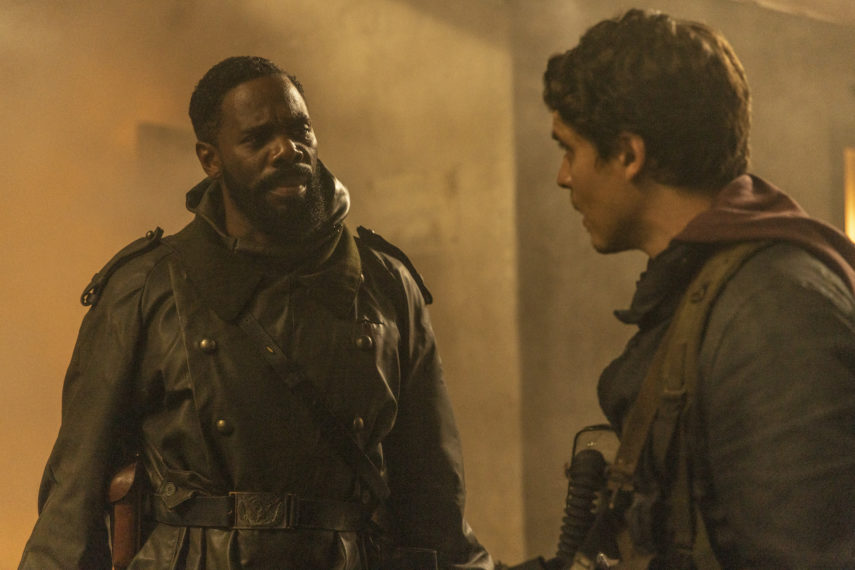
Lauren “Lo” Smith/AMC
You’ve looked like you’re having a blast this season, in general. But it looked like you were really having a blast in that scene where Strand’s accusing everyone of poisoning him. What was that like to film?
That’s like Richard III, suddenly! I loved the way this episode was written. There’s such high stakes and high emotions, and it’s very much a character-driven moment. It’s not about walkers or fights or stunts or visual effects, which I love as well. But this was truly about characters, and story, and working off of each other. To work opposite my co-stars in this highly volatile, adrenaline-driven scene, was amazing. I had a great time. I felt like I was doing work I had done in the theatre, which was playing your actions. Not just playing your emotions—playing your actual action in high stakes.
And yes, I’ve been having the time of my life this season. I think that the writers have thrown me the ball so we can truly see how Strand operates, and also, to be very honest, to see what I do as an actor. I think the show thrives because it is an ensemble, but every so often it is nice for anyone in the ensemble to get material that is suited to their skill set.
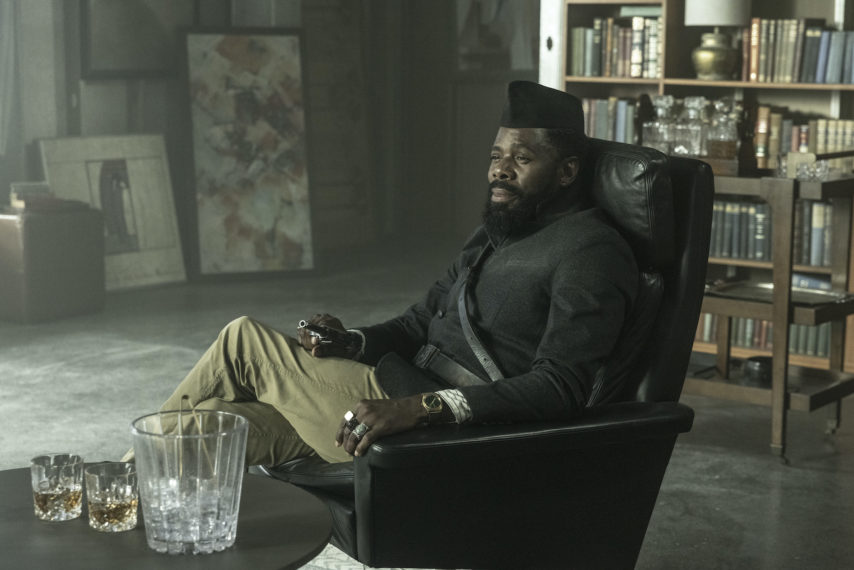
Lauren “Lo” Smith/AMC
When Strand looks at the portrait at the end and says “this is how people need to see me,” what does he mean?
I think that what the artist had done is painted a really gorgeous, epic portrait of what she sees. He asks her, in the beginning—he says, “I don’t want you to do that. I want you to see what I see.” That’s the challenge. How do I see the world, how do I see myself? That’s what the portrait is. For it to be the beautiful, idealized portrait of a leader was not enough for him. By the time it was ripped to shreds by walkers and bloodied and torn up a bit, he thought, “That’s more like it. That’s who I am. That’s what I need you to see; how complicated I am.” And also, because I think that’s a very honest portrayal of himself. He’s like, “No, no, no. I want you to see what I’ve built and the way I’ve done it. It’s beautiful, it’s power, it’s grisly, it’s intelligent, it’s witty, it’s dark, it’s bloody, but it’s real.” I think he wants people to challenge history and the way we interpret it.
Why does Strand want to be Baby Mo’s new father?
Didn’t you just die? [laughs] When I read that, I was like, “Oh my God, what?” And then I started laughing, and I was like, “Wait, what does this mean?” What I love about it so much is that Strand is so complicated. Just when you think you know him, you don’t know him. I love that the writers have embraced this. He compartmentalizes so much in his day-to-day: He can be fully present in every moment. He can be fully sincere in one moment, and then he can be a killer in the next moment. He can hug you, and then he can punch you. In this moment, when he’s realizing he feels very alone—he’s almost like a baby, in a way. “What do I need? I need that little thing that reached out to me and held my face with love. I need the baby. That will fill up this hole, right now.”
So, he’s looking at fatherhood as a way to fill the emptiness inside, perhaps?
Yes! I don’t even know if he’s thinking, truly about fatherhood. I think it’s dumber than that. I think it’s not as evolved. To say, “I want to be the father” is a very evolved point of view, and I think he’s looking, simply, to fill a hole in the moment. It’s like people who say, “Oh, I guess I need a puppy,” you know?
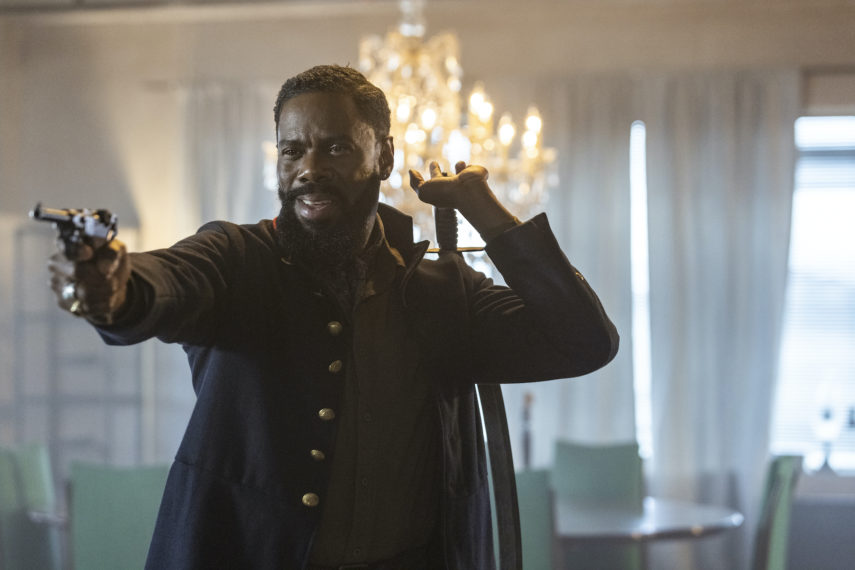
Lauren “Lo” Smith/AMC
Before Strand hands Mo down to Morgan, he mentions his father “barely looked at him.” Is that something you’d always imagined was part of Strand’s backstory? Or did that come from the writers’ room?
The beautiful thing is that it’s a collaboration between me and the writers. I suggested to the writers to drop in even deeper, what’s going on with Strand in that moment. I thought it was an opportunity for him to reveal more of himself. He doesn’t have Alicia (Alycia Debnam-Carey), who he’d usually reveal himself to, or Madison. He has this innocent child. In that moment, it brings out something truly sincere in him.
To be honest, I requested a bit of that trajectory in that moment, and the writers loved it. I thought, “Okay, look at these people who we’ve seen, historically, who have power and power and power has gone to their head.” All they want is power, and more power. At the end of the day, they probably just needed a hug from their dad when they were a kid. I thought that’s what he really needs. He was never looked at or loved at a very formative time in his life, and that’s what’s driving him. He thinks about power because he’s missing somebody holding him. I said this to the writers, “Do you notice no one ever touches Strand?” What does that do to a person, when he is not touched? He doesn’t even have romantic love. No one ever puts a hand on his arm, his shoulder. And what if that has happened for a very long time? So, you get to understand who Strand is a little bit more. With any good villain, you have to understand what their psychology is, and at their core—and it’s a very dumbed-down thought—what do they just need? They just need love, and a hug. Like everybody else.
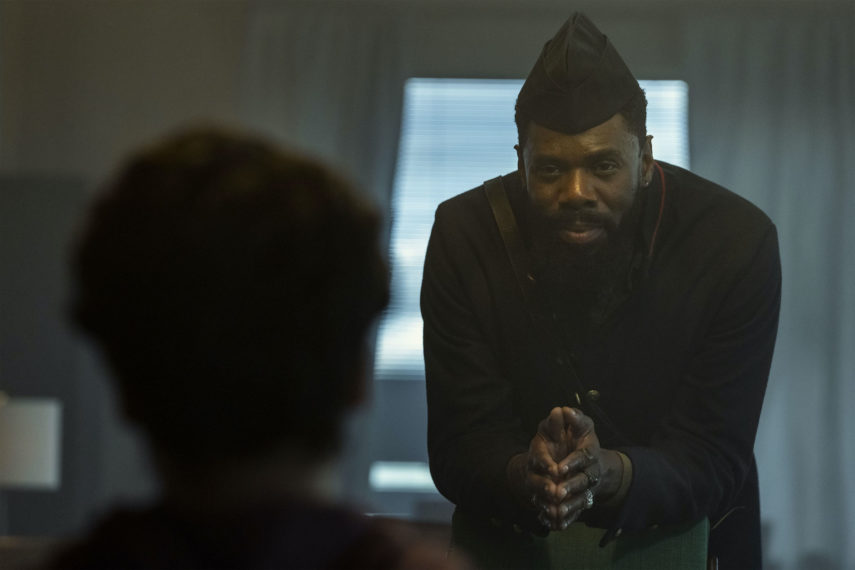
Lauren “Lo” Smith/AMC
I have to ask about Strand’s outfit. How did that particular look come together?
At the end of Season 6, me and (showrunners) Ian (Goldberg) and Andrew (Chambliss) and (costume designer) Jo (Katsaras) and Zureta (Schulz), our other costume designer, we were all collaborating. We knew he was going to have his own civilization. What did that look like? I went immediately to, “He’s going to call museums and homes and department stores, and he’s going to meet up with this historian.” The moment they said he was going to meet a historian with all this art, I was like, “Oh, my God.”
I went home and researched and saw the museums that were around and available in Texas and what was there; stuff from the world wars, and stuff like that. I went, “We’ve got to do that. He’s got to wear an army general’s outfit. Anything associated with history—swords, you name it.” I thought that everything about him had to be a uniform: It had to be power. Every time you see him, you need to know that he’s running things. It may look a little ridiculous, a little extreme, but that’s where he is. It has to be definitive. “This is my tower, this is my power, and this is my world.” It can’t be subtle, wearing a T-shirt and jeans. [laughs] I think he’s taken a bit of what he learned from Virginia (Colby Minifie)—Virginia had her hats and it was all uniform. [Strand thought], “What does my kingdom look like? It looks like this.”
The first time I saw it, I smiled. It was just so Strand.
Right? And then we added all these rings, because anything that may not have value anymore, he’s willing to imbue with value. So, he’s got rings and belts and boops. I love it. Every time I go into his closet, I smile as well.
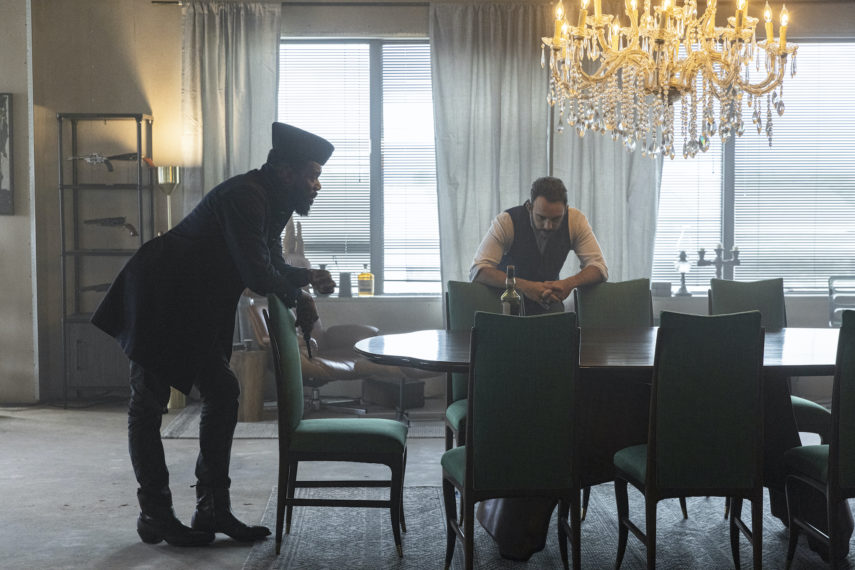
Lauren “Lo” Smith/AMC
Toward the end of the episode, Howard asks Strand if he’s okay. Strand swerves that question. Where’s he really at?
Very well not okay! I would say even the question is absurd to him. It’s not even an evolved question. “Do you have a couple hours on the couch for me to tell you how I actually am? Do you want to know all that? If you want to ask if I’m okay, I can give you a two-letter sentence, as well.” [laughs] It’s “no” or “do you have time to really unpack this? Then we can talk about it.”
Preview what’s to come for Strand when we see him again.
You’re going to find Strand running through a forest with daisies and sitting on a lily pad… I’m totally kidding. [laughs] I think that you’re going to find Strand, still, in this very complicated place. Especially as he comes upon more people who know him from the past. He’s still trying to reckon with the past, as he’s desperately trying to move forward.
Fear The Walking Dead, Sundays, 9/8c, AMC
From TV Guide Magazine
How 'Countdown' Recruited Jensen Ackles to Go Full 'Die Hard'
Countdown boss Derek Haas talks creating the character around Ackles, and the cast teases the “Avengers”-like team of the crime thriller. Read the story now on TV Insider.
